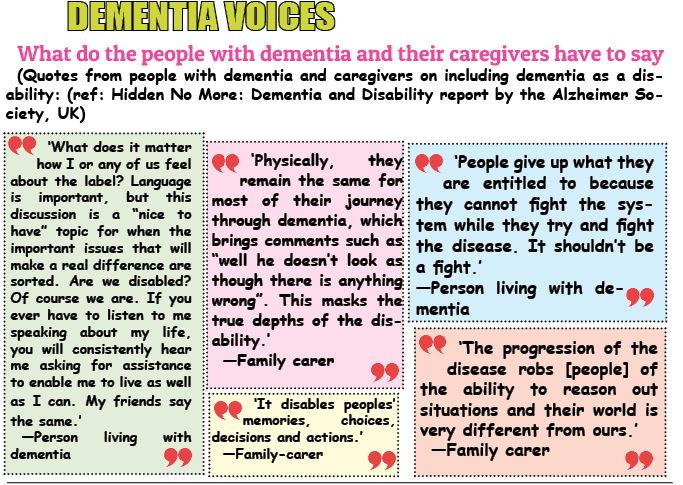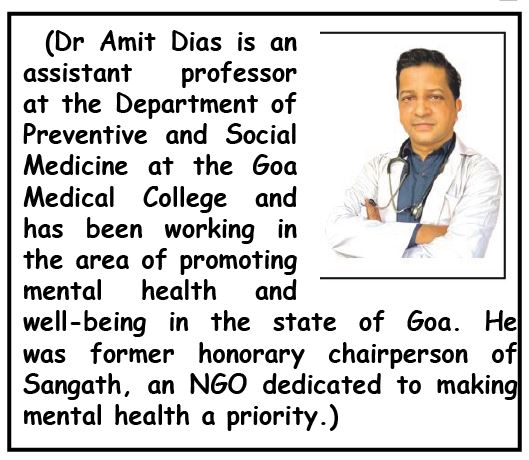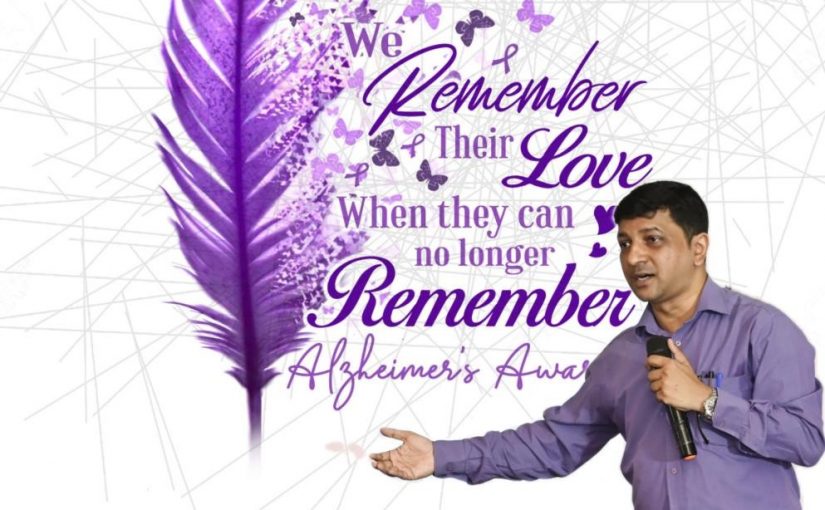People suffering from dementia are also with differently abled…
This has been an exciting week for mental health and disability. Last Sunday, the Indian Medical Association announced the priority of the newly installed committee to be “Mental Health” and the week gone by in Goa hosted the International Purple Festival as a mark of inclusiveness of people who are differently able. DR AMIT DIAS, MD, who has been associated with the dementia movement in Goa, reminds us that people with dementia are also differently abled. He explains why a person with dementia should also be included as an ambassador at the International Purple Festival in Goa in future.
AMIDST the buzz around inclusiveness and disability, we need to hear the voice that says “Remember me” — the voice of people with dementia who are often missing from the list of disabilities.
Without a doubt, dementia is one of the most severe disabilities affecting the elderly. Dementia also fits in the definition of disability according to the United Nations Convention on the Rights of People with Disabilities. Coincidentally, the color purple is the color that also represents the Alzheimer’s awareness movement. Somehow this chronic neurodegenerative condition is often forgotten on the discussion tables on the subject of disability.
As one sees the color purple, one needs to be reminded of the fact that people with dementia are also differently abled and the condition needs to be brought under the Rights of People with Disability (RPwD) Act of 2016.
In order to justify the inclusion of dementia as a disability, one needs to understand the definition of disability.
The UNCRPD defines a person with a disability as someone who has long-term physical mental, intellectual, or sensory impairments which in interaction with various barriers may hinder their full and effective participation in society on an equal basis as others.
If you look at the definition of the UNCRPD, you will realize that dementia fulfills every word in the definition.
The Right to Disability Act 2016 however does not mention Alzheimer’s disease and dementia. The RPwD act mentions Parkinson’s disease, multiple sclerosis blood disorders in addition to learning difficulties, autism, locomotor disability, visual and hearing impairment, intellectual disability, etc. This is partly the reason for missing out on dementia from disability discussions. The RPwD act mentions Parkinson’s disease, Multiple sclerosis Blood disorders in addition to learning difficulties, autism, locomotor disability, visual and hearing impairment, intellectual disability, etc. However, it does not specifically mention Alzheimer’s disease and dementia, which is partly the reason for missing out on dementia from disability discussions.
Including dementia in the Purple Festival will help raise awareness and fight stigma:
People with dementia can be at various stages and different levels of functional ability. Including them in the international festival will help de-stigmatize the condition and also help raise awareness of the same. Life does not end with the diagnosis of dementia and a lot can be done to keep the person functional. Alzheimer’s Disease International and other associations often have brand ambassadors who are people with dementia.
Dementia is associated with long-term physical, mental, and intellectual impairments that hinder the full participation of the person affected in society to their full capacity. To be more precise, dementia is an age-related progressive neurodegenerative disorder characterized by a significant decline in one or multiple cognitive domains such as memory, learning, language, executive function, perception, social engagement, and complex attention.
For a medical diagnosis of dementia, the loss should be to such an extent that it affects the activities of daily living. We also need to be clear that “disabled” is not the same as “not able” … it means that they are “differently abled” and need appropriate support to carry out their activities of daily living, similar to other persons with disability.
How can including dementia as a disability help the cause?
According to the Dementia India report, we will have around 4 million people with dementia in our country and around 55 million in the world. As our country goes through a demographic transition, these numbers are going to rise rapidly. Research conducted in Goa at the Goa Medical College and the Dementia Society of Goa has revealed that with special training and support, caregivers can act as catalysts to create an enabling environment for people with dementia to help them improve their functional ability and quality of life.
For this, we need to first acknowledge that there is a disability in people with dementia and they need our support to be included in society. We need to build a dementia-friendly community. While we spread the message of inclusion for people with disability, we should not forget people with dementia.
By looking at dementia as a disability, we open our minds to explore different areas and opportunities for people with Alzheimer’s disease and their caregivers. We can look at dementia through a different prism to direct our attention to promoting a friendly and enabling environment. People with dementia can benefit from the policies on inclusion developed for people with disability. It will also help raise awareness of the condition, fight stigma, and break the barriers to good quality care.
Dementia affects more people than we think:
Sometimes there is a misunderstanding that dementia affects the very old and there is no point in including them in the list of disabilities that need attention. This is not true, one needs to realize that dementia can also occur in younger people. Research reveals that in people aged 30-64 years, 38-260 people in 100,000 — equivalent to 0.038–0.26% develop early onset dementia. This increases to 0.4% in the 55–64 age bracket. Indeed, dementia often presents itself beyond the age of 60 years, but 60 years in today’s context is not old to be forgotten.
This is a sensitive topic and people may have different opinions. However, the fact remains that dementia is a disability and its special needs have to be addressed. Organizations such as Alzheimer’s Disease International and the Alzheimer’s and Related Disorders Society of India are striving hard to be the voice of people with dementia. We need to hear that voice and respond. It is my humble suggestion to include dementia ambassadors at the Purple Festival in the future.

NO HEALTH WITHOUT MENTAL HEALTH
An interview with Dr Amit Dias

This week the nation was shocked to hear the news of the gruesome murder of a 4-year-old child by his mother who had come to Goa the weekend. Presumably the mother was suffering from mental ill-health…for which mother in her right senses would commit such a heinous crime? The presumption is that this was one very sick mother in the mind due to the reportedly breakdown of her marriage…all this besides, this week we also had the Indian Medical Association, Goa State branch, announcing its decision to make mental health of the people as the main focus of the newly installed IMA committee.
We spoke to Dr Amit Dias who has been associated with the cause of mental health, to enlighten us on the subject and how we may detect early signs of mental illness in those around them and their loved ones. “There can be no health without mental health,” he says, “You must be kind to your mind!”
Goan Observer: Doctor, could you explain the importance of mental health?
Dr Amit Dias: To put it in simple words, there can be no health without mental health. It is time we bring the topic out of the shadows and speak about it to fight the taboos and stigma that surround it. We need to be more proactive to overcome the barriers to mental health care. The announcement by the IMA state cell to focus on mental wellness is a welcome one.
Q:What are the barriers to achieving mental health?
A: Sometimes the barriers are within us. We do not recognize the signs and take the first step. Discrimination against people with mental illness, lack of awareness and stigma and lack of services are just some of them. If we look around, we will find that people with mental illness are often abused and neglected. This has to change. Everyone has a right to the highest attainable standard of mental health. This includes the right to be protected against mental health risks and the right to accessible, acceptable good quality care to keep them mentally and emotionally healthy.
Q:What are the signs of mental illness?
A: Mental illnesses can manifest in various ways and the signs can vary depending on the specific disorder. It’s important to note that experiencing some of these signs does not necessarily mean someone has a mental illness, as many factors can contribute to temporary changes in behavior or mood. However, persistent or severe symptoms may indicate a need for professional evaluation and support. Common signs of mental illness include:
• Changes in mood — persistent sadness or feelings of hopelessness
• Withdrawal from social activities or relationships
• Changes in sleep patterns (insomnia or excessive sleeping)
• Changes in appetite or weight
• Avoidance of usual responsibilities
• Cognitive difficulties: (memory problems)
• Physical symptoms: (unexplained aches and pains)
• Distorted thinking: Paranoia or excessive fear, delusions
• Difficulty distinguishing between reality and imagination
• Impaired functioning
• Difficulty performing daily tasks at home, work or school
• Decline in academic or occupational performance
• Social withdrawal
• Substance use
• Suicidal thoughts or behavior
Q: Doctor, what advice would you give our readers for promoting mental wellbeing and preventing mental health problems?
A: There is a lot that one can do to prevent mental illness and promote wellbeing,
Sleep well: It is very essential for our mental health. Ensure that you don’t neglect your sleep and practice sleep hygiene. One of the interventions we had in the DIL project is called brief behavioral therapy for insomnia. We would identify elders with sleep-related issues and teach them non-pharmacological techniques to sleep well. You need to feel fresh when you wake up in the morning.
Stay Connected: Man is a social animal, so stay connected. There can be no replacement for physical contact. Only in its absence use technology to connect with friends, well-wishers and family. Surround yourself with positive people, it will keep you positive.
Talk about it: Sharing your problems with someone can help relieve the stress to quite an extent. Find someone non-judgmental, someone with empathy to speak to. Counselors are trained in these skills and can help you arrive at the right decision. We also have a lot of helplines which can assist in getting help.
Engage in happy activities: Find out something healthy that you like doing. It could be something as simple as singing, dancing, playing with your pet, cooking, running, reading, pressing a stress ball, talking with friends, or taking a walk on the beach… make time for yourself and things that you like to do.
Stay active: In our research on the prevention of depression in late life (The DIL Study) we found that physical activity played a major role in preventing depression in the elderly. The new year season is the time people make resolutions on exercise and physical fitness, however we need to pursue our resolutions all through the year.
Mind the mind: Adopt any meditation method you have access to, there are several meditation techniques. Yoga is one of them. This will help your mind rejuvenate and relax.
Nutrition: Eat to live and not live to eat. You cannot have good mental health if you have compromised physical health. Our diet plays an important role in our overall physical as well as mental wellbeing. Be conscious of what you eat, after all, we are what we eat.
Be goal-oriented: Many people complain that they feel worthless and useless. Have a purpose in life and a goal to look forward to. Spend time with relatives who make you feel special.
Visit a mental health specialist: If you feel you have a problem, then visit a counselor or a mental health specialist and talk about it.
Q: What is your advice to our readers?
A: It’s crucial to recognize that everyone’s experience with mental health is unique and different. If you or someone you know is experiencing the symptoms of mental illness, it’s essential to seek professional help from a mental health provider. They can assess the situation, provide a diagnosis if necessary, and recommend appropriate treatment options. Mental health conditions are treatable, and seeking help is a sign of strength. Remember it’s OK to talk.

